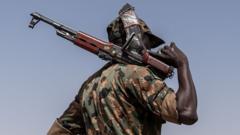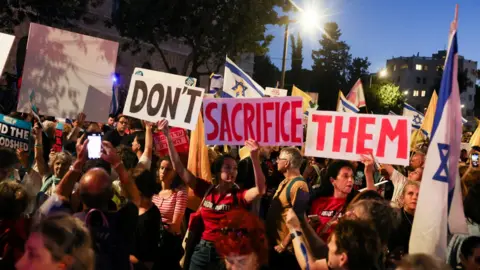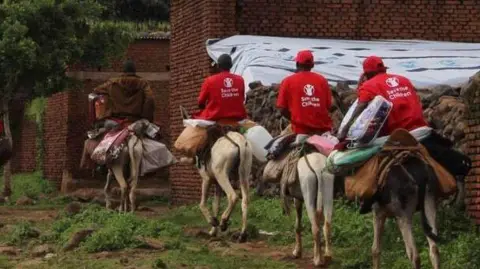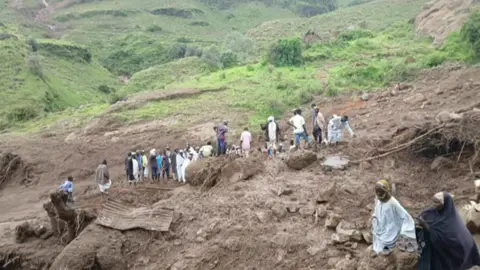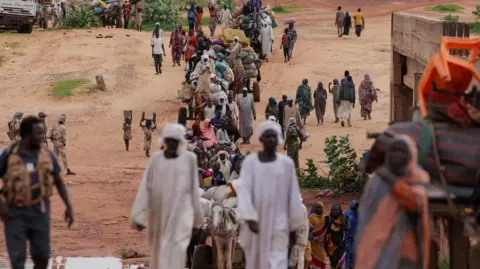The conflict in Sudan has deteriorated significantly as the Kordofan region becomes a pivotal battleground. This area, rich in oil and strategically important, is central to the ongoing war between the Sudanese army and rival paramilitary groups, particularly the Rapid Support Forces (RSF). Recent attacks that resulted in civilian casualties have drawn attention to the intensity of these confrontations.
Amir Amin, an analyst from Oasis Policy Advisory, emphasizes the stakes involved: "Whoever controls Kordofan controls the country’s oil supply and a significant part of Sudan." This region not only impacts Sudan directly but is also vital for neighboring South Sudan, which relies on Kordofan's pipelines for its oil exports.
The fighting escalated in June 2023, when the army shifted its focus to reconquering territory lost to the RSF, which had recently gained momentum by capturing Khartoum and the Gezira state agricultural hub. The military's leader, General Abdel Fattah al-Burhan, made a rare visit to Khartoum on June 20, but his presence highlighted the destruction of the capital following prolonged conflict.
The war has claimed approximately 150,000 lives, with about 12 million people displaced, a figure comparable to the population of Tunisia or Belgium. The RSF, which initially allied with Burhan to stage a coup in 2021, has become his primary opponent after a fallout between their leaders, leading to an all-out war.
Analysts suggest that the military aims to defeat the RSF in Kordofan to bolster its position in the west toward Darfur, the birthplace of the RSF. Conversely, the RSF believes that seizing Kordofan would rejuvenate its efforts and place it within striking distance of Khartoum.
Despite the army's bombardment of RSF positions, experts like Dr. Suliman Baldo express skepticism about the military's ability to break through RSF defenses, particularly given the latter's strong ethnic ties to the local Misseriya community. Local sentiments have soured due to the military's aerial assaults, leading to a backlash against alleged collective punishment.
RSF officials have warned that they might escalate the conflict to include Heglig, an essential oil-producing area, if aerial strikes do not cease. Recent strikes reportedly killed over 20 civilians, prompting condemnation from humanitarian agencies such as the UN, which criticized the targeting of non-combatants.
As violence escalates, fears grow about a potential increase in civilian casualties, especially with RSF mobilizing for an offensive against el-Obeid, the capital of North Kordofan state. The strategic town of Umm Sumaima has changed hands multiple times, and its control is seen as crucial for both factions.
With Kordofan poised to be the definitive battleground, the long-term implications of this conflict could reshape the power dynamics in Sudan. The outcome may not only affect local control but could also signal a significant shift in the conflict's trajectory.
Amir Amin, an analyst from Oasis Policy Advisory, emphasizes the stakes involved: "Whoever controls Kordofan controls the country’s oil supply and a significant part of Sudan." This region not only impacts Sudan directly but is also vital for neighboring South Sudan, which relies on Kordofan's pipelines for its oil exports.
The fighting escalated in June 2023, when the army shifted its focus to reconquering territory lost to the RSF, which had recently gained momentum by capturing Khartoum and the Gezira state agricultural hub. The military's leader, General Abdel Fattah al-Burhan, made a rare visit to Khartoum on June 20, but his presence highlighted the destruction of the capital following prolonged conflict.
The war has claimed approximately 150,000 lives, with about 12 million people displaced, a figure comparable to the population of Tunisia or Belgium. The RSF, which initially allied with Burhan to stage a coup in 2021, has become his primary opponent after a fallout between their leaders, leading to an all-out war.
Analysts suggest that the military aims to defeat the RSF in Kordofan to bolster its position in the west toward Darfur, the birthplace of the RSF. Conversely, the RSF believes that seizing Kordofan would rejuvenate its efforts and place it within striking distance of Khartoum.
Despite the army's bombardment of RSF positions, experts like Dr. Suliman Baldo express skepticism about the military's ability to break through RSF defenses, particularly given the latter's strong ethnic ties to the local Misseriya community. Local sentiments have soured due to the military's aerial assaults, leading to a backlash against alleged collective punishment.
RSF officials have warned that they might escalate the conflict to include Heglig, an essential oil-producing area, if aerial strikes do not cease. Recent strikes reportedly killed over 20 civilians, prompting condemnation from humanitarian agencies such as the UN, which criticized the targeting of non-combatants.
As violence escalates, fears grow about a potential increase in civilian casualties, especially with RSF mobilizing for an offensive against el-Obeid, the capital of North Kordofan state. The strategic town of Umm Sumaima has changed hands multiple times, and its control is seen as crucial for both factions.
With Kordofan poised to be the definitive battleground, the long-term implications of this conflict could reshape the power dynamics in Sudan. The outcome may not only affect local control but could also signal a significant shift in the conflict's trajectory.

